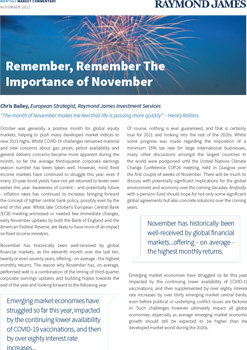October was generally a positive month for global equity markets, helping to push many developed market indices to new 2021 highs. Whilst COVID-19 challenges remained material and new concerns about gas prices, petrol availability and general delivery concerns became more apparent during the month, so far the average third-quarter corporate earnings season number has been taken well. However, most fixed income markets have continued to struggle this year, even if many 10-year bond yields have not yet returned to levels seen earlier this year.

